小升初英语语法讲与练动词的时态(Ⅲ)一般过去时态
- 格式:doc
- 大小:63.00 KB
- 文档页数:7
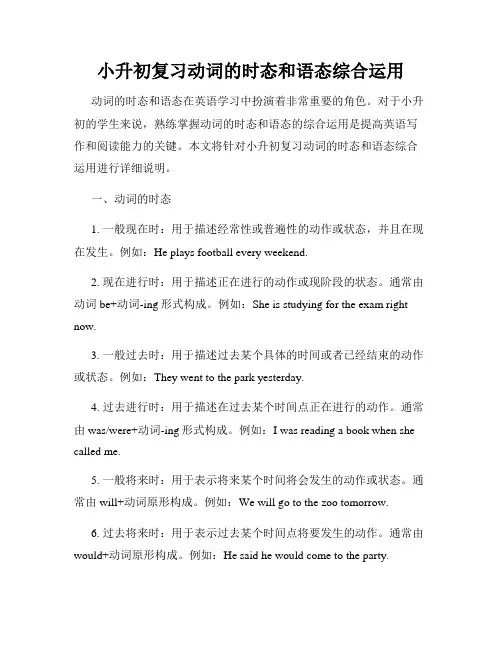
小升初复习动词的时态和语态综合运用动词的时态和语态在英语学习中扮演着非常重要的角色。
对于小升初的学生来说,熟练掌握动词的时态和语态的综合运用是提高英语写作和阅读能力的关键。
本文将针对小升初复习动词的时态和语态综合运用进行详细说明。
一、动词的时态1. 一般现在时:用于描述经常性或普遍性的动作或状态,并且在现在发生。
例如:He plays football every weekend.2. 现在进行时:用于描述正在进行的动作或现阶段的状态。
通常由动词be+动词-ing形式构成。
例如:She is studying for the exam right now.3. 一般过去时:用于描述过去某个具体的时间或者已经结束的动作或状态。
例如:They went to the park yesterday.4. 过去进行时:用于描述在过去某个时间点正在进行的动作。
通常由was/were+动词-ing形式构成。
例如:I was reading a book when she called me.5. 一般将来时:用于表示将来某个时间将会发生的动作或状态。
通常由will+动词原形构成。
例如:We will go to the zoo tomorrow.6. 过去将来时:用于表示过去某个时间点将要发生的动作。
通常由would+动词原形构成。
例如:He said he would come to the party.二、动词的语态1. 被动语态:用于强调动作的承受者而不是执行者。
通常由助动词be+过去分词构成。
例如:The letter was written by him.2. 主动语态:用于强调执行者而不是动作的承受者。
例如:He wrote a letter.三、综合运用在写作和阅读中,我们需要综合运用动词的时态和语态来表达准确的意思。
下面是一些例句:1. I have been studying English for two years.(一般现在时和现在完成进行时的综合运用)我已经学习英语两年了。
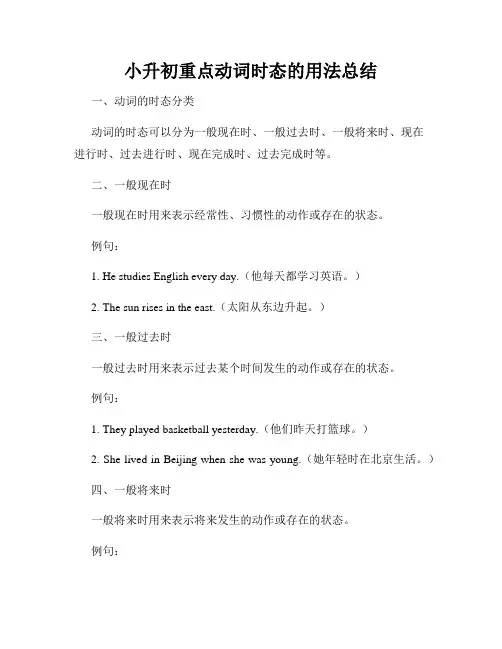
小升初重点动词时态的用法总结一、动词的时态分类动词的时态可以分为一般现在时、一般过去时、一般将来时、现在进行时、过去进行时、现在完成时、过去完成时等。
二、一般现在时一般现在时用来表示经常性、习惯性的动作或存在的状态。
例句:1. He studies English every day.(他每天都学习英语。
)2. The sun rises in the east.(太阳从东边升起。
)三、一般过去时一般过去时用来表示过去某个时间发生的动作或存在的状态。
例句:1. They played basketball yesterday.(他们昨天打篮球。
)2. She lived in Beijing when she was young.(她年轻时在北京生活。
)四、一般将来时一般将来时用来表示将来发生的动作或存在的状态。
例句:1. I will visit my grandparents tomorrow.(我明天会去拜访我的祖父母。
)2. They are going to have a party next week.(他们下周会开派对。
)五、现在进行时现在进行时用来表示现在正在进行的动作。
例句:1. He is reading a book at the moment.(他此刻正在读一本书。
)2. They are playing soccer in the park.(他们正在公园里踢足球。
)六、过去进行时过去进行时用来表示过去某个时间正在进行的动作。
例句:1. I was studying when you called me.(你打电话给我时,我正在学习。
)2. They were watching a movie at that time.(那个时候他们正在看电影。
)七、现在完成时现在完成时用来表示过去某个时间开始并一直延续到现在的动作或状态,或者表示过去经历的事情对现在造成的影响。
例句:1. She has lived here for five years.(她已经在这里住了五年了。
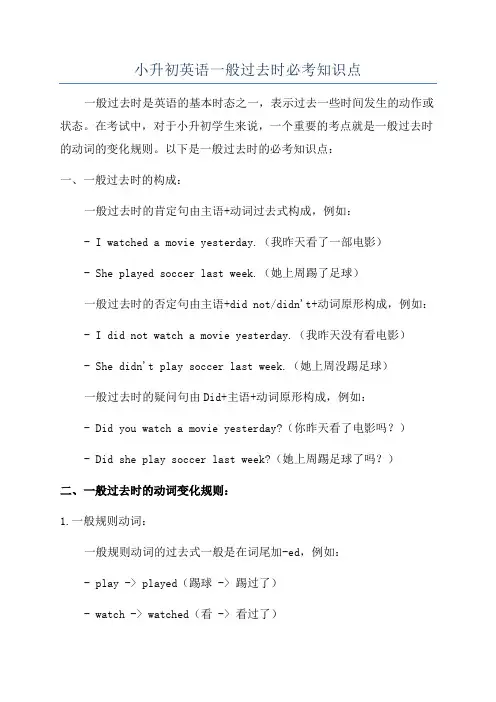
小升初英语一般过去时必考知识点一般过去时是英语的基本时态之一,表示过去一些时间发生的动作或状态。
在考试中,对于小升初学生来说,一个重要的考点就是一般过去时的动词的变化规则。
以下是一般过去时的必考知识点:一、一般过去时的构成:一般过去时的肯定句由主语+动词过去式构成,例如:- I watched a movie yesterday.(我昨天看了一部电影)- She played soccer last week.(她上周踢了足球)一般过去时的否定句由主语+did not/didn't+动词原形构成,例如:- I did not watch a movie yesterday.(我昨天没有看电影)- She didn't play soccer last week.(她上周没踢足球)一般过去时的疑问句由Did+主语+动词原形构成,例如:- Did you watch a movie yesterday?(你昨天看了电影吗?)- Did she play soccer last week?(她上周踢足球了吗?)二、一般过去时的动词变化规则:1.一般规则动词:一般规则动词的过去式一般是在词尾加-ed,例如:- play -> played(踢球 -> 踢过了)- watch -> watched(看 -> 看过了)注意:以字母e结尾的动词,直接加-d即可,例如:- dance -> danced(跳舞 -> 跳过了)2.以辅音字母+y结尾的动词:以辅音字母+y结尾的动词,在变成过去式时,将y改为i,再加-ed,例如:- study -> studied(学习 -> 学习过了)- try -> tried(尝试 -> 尝试过了)3. 以“辅音字母+vowel+辅音字母”结尾的动词:以“辅音字母+vowel+辅音字母”结尾的动词,变成过去式时要双写结尾的辅音字母,再加-ed,例如:- stop -> stopped(停止 -> 停止过了)- plan -> planned(计划 -> 计划过了)4.不规则动词:一些常见的不规则动词在变成过去式时会发生变化,例如:- go -> went(去 -> 去了)- see -> saw(看见 -> 看见了)- eat -> ate(吃 -> 吃了)三、表示过去的时间状语:在使用一般过去时时,经常会遇到表示过去时间的状语词,例如:- yesterday(昨天)- last week(上周)- two days ago(两天前)需要注意的是,当句子中有表示过去时间的状语时,一般过去时的动词仍然用一般过去时,而不是用完成时,例如:- She lived in Beijing three years ago.(她三年前住在北京。

拨开云雾见时态(一)--一般现在时Contents三大用法三单肯否疑大显身手一般现在时三大用法规律性的动作 Xiao Fan has three bowls of rice for dinner on Fridays.Da Qiang sleeps with the duck every day.现在的状态 I am a teacher.You are a student.He is a policeman.There is a snake.真理 The sun is bigger than the earth.The earth travels around the sun.三单动词第三人称单数变化规则一般:加s二般:以s、x、ch、sh、o结尾,加es三般:以辅y结尾,变y为i加es四特:have→has三单使用条件不是我,不是你,并且只有一个肯定句、否定句、疑问句I am a teacher. He is 30 years old. We are clever.I am not a dancer. He is not 13 years old. We are not stupid. Are you a teacher? Is he 30 years old? Are you clever?I eat 2 eggs every day.I don’t eat 2 eggs every day.Do you eat 2 eggs every day?She eats 20 eggs a week.She doesn’t eat 20 eggs a week.Does she eat 20 eggs a week?大显身手1.We often ___________ (play) in the playground.2.He _________ (get) up at six o’clock.3.Danny (study) English, Chinese, Maths, Science and Art at school. 4.She often __________ (watch) TV with her dog.5.__________ you_________ (brush) your teeth every morning?6.What (do) he usually (do) after school?1.I have many books. (改为否定句)__________________________________________2.Da Shan’s sister likes playing table tennis. (改为否定句)__________________________________________3.I watch TV every day. (改为一般疑问句)__________________________________________4.Yu Paopao is the cleverest student in her class. (改为否定句)__________________________________________Keys:1.play 2.gets 3.studies 4.watches 5.Do, brush 6.does, do 1.I don’t have many books.2.Da Shan’s sister doesn’t like playing table tennis.3.Do you watch TV every day?4.Yu Paopao is not the cleverest student in her class.测试题一、写出下列动词的第三人称单数形式get ________________ sit ________________come ________________ drive _________________fly _________________ study _________________wash _________________ watch _________________go ________________ do _________________二、单项选择1.Where _________ he _________ from?A.is, come B.do, comeC.does, come D.are, from2.We _____________ any Chinese cla sses on Friday.A.don’t has B.doesn’t haveC.don’t have D.are have3.Wang Mei __________ music and often ___________ to music.A.like; listen B.likes; listensC.like; are listening D.liking; listen4.Jenny ____________ in an office. Her parents ____________in a hospital.A.work ; works B.works ; workC.work ; are working D.is working ; work三、句型变化1.Tony watches TV every evening. (改为否定句)_________________________________________.2.Amy likes playing computer games. (改为一般疑问句) _________________________________________?3.Sun Yang washes clothes on Saturday.否定句: __________________________________一般疑问句: ______________________________肯定/ 否定回答 __________________ / __________________Keys:一、gets si ts comes drives fliesstudies washes watches go es does二、CCBB三、1. Tony doesn’t watch TV every evening.2. Does Amy like playing computer games?3. Sun Yang doesn’t wash clothes on Saturday.Does Sun Yang wash clothes on Saturday?Yes, he does. / No, he doesn’t.拨开云雾见时态㈡-- 一般过去时Contents肯否疑动词过去式大显身手一般过去时描述过去发生的事肯定句、否定句、疑问句I was in a quiet street.I was not in a quiet street.Was I in a quiet street? (Were you in a quiet street?)I had a dream last night.I didn’t have a dream last night.Did I have a dream last night? (Did you have a dream last night?) 动词过去式变化规则动词过去式,ed来结尾一般直接加,见e只加d辅y结尾y变i,再加ed重读辅元辅,双写尾字母常见不规则动词过去式大全am, is→wasare→werecut→cuthit→hitlet→letput→putcost→costhurt→hurtread→readfeel→feltmeet→metsmell→smeltfi nd→foundget→gothave→hadhold→heldmake→madesell→soldtell→toldcome→came become→becamerun→ranlearn→learned/learnt hear→heardwin→woncatch→caught teach→taughtbring→broughtbuy→boughtthink→thoughtfly→flewthrow→threwgrow→g rewknow→kneweat→atefall→fellgive→gavetake→tooksee→sawwrite→wroteride→rodedrive→drovebuild→builtlend→lentsend→sentspend→spentlose→lostpay→paidsay→saiddraw→drewshow→showed speak→spokebreak→brokesteal→stolewake→woke choose→ch ose forget→forgotsleep→sleptsweep→sweptstand→stoodunderstand→understoodbegin→beganring→rangsing→sangswim→swamdrink→drankdo→didgo→wentsit→sat时间标志词yesterday …ago last… the day before yesterday just now this morning i n 2008大显身手1.There _________ (be) no one here a moment ago.2.Helen and Nancy _________ (be) good friends, but now they are not. 3.I listened b ut ___________ (hear) nothing.1.How is Jane yesterday? ________2.He go to school by bus last week. ________3.I can fly kites seven years ago. ________4.Did you saw him j ust now. ________5.Tom wasn't watch TV last night. ________6.I did not my homework yesterday. ________Keys:1.was 2.were 3.heard 1.is→was2.go→went3.can→could4.saw→see . →?5.wasn’t→didn’t6.did not后面加do测试题一、写出下列动词的第三人称单数形式、过去式形式go_______ _______ enjoy_______ _______buy_______ _______ like_______ _______get _______ _______ walk_______ _______take_______ _______ dance_______ _______ write_______ _______ run_______ _______swim_______ _______ find_______ _______begin_______ _______ eat_______ _______play_______ _______ study_______ _______ 二、单项选择1.I ______________ my room last Sunday.A.cleaned B.clean C.am cleaning D.cleans2.What ______________ Mike do last weekend?A.do B.does C.is D.did3.______________ you ______________ TV last night.A.Do, watch B.Did, watch C.Did, watched D.Does, watches 4._____________ he ____________ football two days ago?A.Does, play B.Did, played C.Did, play D.Does, playing 5.They _______________ on a trip in February, 2007.A.are going B.going C.went D.goes6.She watered the flowers _______________.A.tomorrow B.sometimesC.yesterday morning D.every morning7.Mike_____________ a big tiger in the nature park last year.A.saw B.see C.seeing D.seen8.------ Good afternoon, Miss Lee. How does Mike feel?------ He’s tired. H e ____________ a lot of work ______________ .A.does, this morning B.do, this morningC.did, this morning D.have, this morning三、找出以下短文中的动词过去式,并将其对应的动词原形写出来The City Mouse and the Country MouseOnce there were two mice. They were friends. One mouse lived in the country; the other mouse lived in the city. After many years the Country mouse saw the City mouse; he said, "Do come and see me at my house in the country." So the City mouse went. The City mouse said, "This food is not good, and your house is not good. Why do you live in a hole in the field? You should come and live in the city. You would live in a nice house made of stone. You would have nice food to eat. You must come and see me at my house in the city."The Country mouse w ent to the house of the City mouse. It was a very good house. Nice food was set ready for them to eat. But just as they began to eat they heard a great noise. The City mouse cried, " Run! Run! The ca t is coming!" They ran away quickly and hid.After some time they came out. When they came out, the Country mouse said, "I do not like living in the city. I like living in my hole in th e field. For it is nicer to be poor and happy, than to be rich and afraid."Keys:goes went enjoys enjoyed buys bought eats ategets got walks walked takes took dances danced writes wrote runs ran swims swam finds found begins began likes likedp lays played studies studied ADBC CCACwere arelived livesaw see拨开云雾见时态㈢-- 一般将来时Contents肯否疑will、be going to大显身手一般将来时描述将来发生的事肯定句、否定句、疑问句Tigers will be a kind of vehicle.Tigers will not be a kind of vehicle. (will not=won’t)Will tigers be a kind of vehicle?Cars will run everywhere.Cars won’t run everywhere.Will cars run everywhere?时间标志词tomorrow soon from now on in the future next+ in+be going to两大用法1 打算做某事I’m going to be a si nger.She is going to learn French.2 根据现象作出推断It’s going to rain.She is going to faint. (她要晕了。
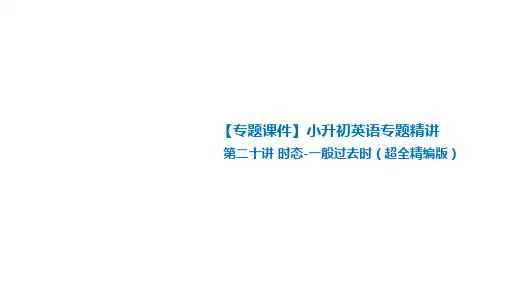
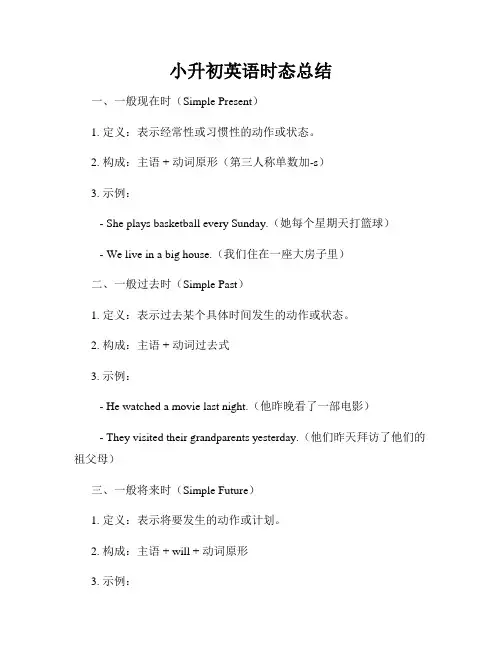
小升初英语时态总结一、一般现在时(Simple Present)1. 定义:表示经常性或习惯性的动作或状态。
2. 构成:主语 + 动词原形(第三人称单数加-s)3. 示例:- She plays basketball every Sunday.(她每个星期天打篮球)- We live in a big house.(我们住在一座大房子里)二、一般过去时(Simple Past)1. 定义:表示过去某个具体时间发生的动作或状态。
2. 构成:主语 + 动词过去式3. 示例:- He watched a movie last night.(他昨晚看了一部电影)- They visited their grandparents yesterday.(他们昨天拜访了他们的祖父母)三、一般将来时(Simple Future)1. 定义:表示将要发生的动作或计划。
2. 构成:主语 + will + 动词原形3. 示例:- I will go to the park tomorrow.(我明天会去公园)- She will study hard for the exam.(她会为考试努力学习)四、现在进行时(Present Continuous)1. 定义:表示现在时刻正在进行的动作。
2. 构成:主语 + am/is/are + 动词-ing形式3. 示例:- They are playing football in the park.(他们正在公园踢足球)- I am studying English now.(我正在学习英语)五、过去进行时(Past Continuous)1. 定义:表示过去某个时间段内正在进行的动作。
2. 构成:主语 + was/were + 动词-ing形式3. 示例:- He was watching TV when I called him.(我给他打电话时,他正在看电视)- We were having dinner at 7 pm last night.(昨晚7点我们正在吃晚餐)六、将来进行时(Future Continuous)1. 定义:表示将来某个时间点正在进行的动作。

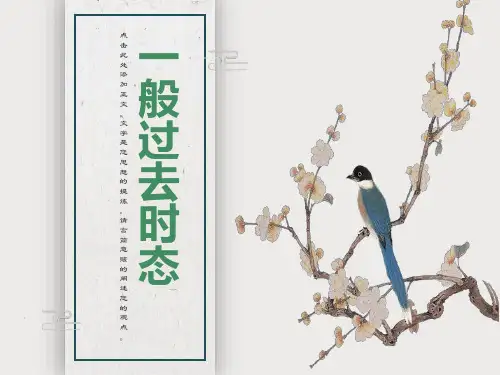
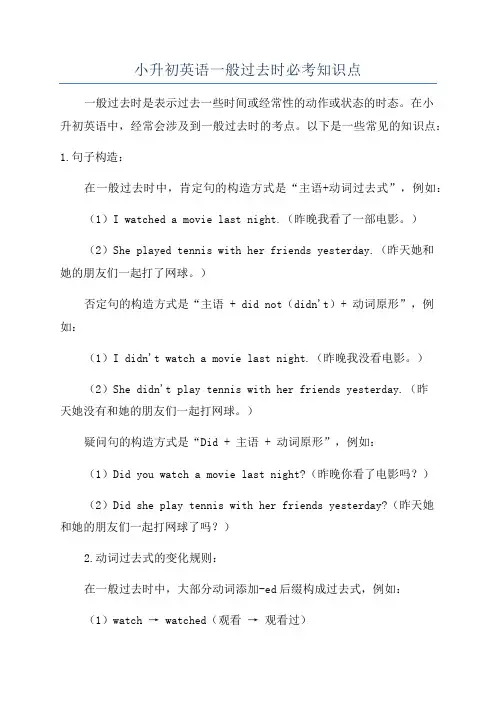
小升初英语一般过去时必考知识点一般过去时是表示过去一些时间或经常性的动作或状态的时态。
在小升初英语中,经常会涉及到一般过去时的考点。
以下是一些常见的知识点:1.句子构造:在一般过去时中,肯定句的构造方式是“主语+动词过去式”,例如:(1)I watched a movie last night.(昨晚我看了一部电影。
)(2)She played tennis with her friends yesterday.(昨天她和她的朋友们一起打了网球。
)否定句的构造方式是“主语 + did not(didn't)+ 动词原形”,例如:(1)I didn't watch a movie last night.(昨晚我没看电影。
)(2)She didn't play tennis with her friends yesterday.(昨天她没有和她的朋友们一起打网球。
)疑问句的构造方式是“Did + 主语 + 动词原形”,例如:(1)Did you watch a movie last night?(昨晚你看了电影吗?)(2)Did she play tennis with her friends yesterday?(昨天她和她的朋友们一起打网球了吗?)2.动词过去式的变化规则:在一般过去时中,大部分动词添加-ed后缀构成过去式,例如:(1)watch → watched(观看→ 观看过)(2)play → played(打→ 打过)但也有些规则不规则的动词需要特殊处理,例如:(1)go → went(去→ 去过)(2)have → had(有→ 有过)3.时间状语的运用:时间状语是修饰动作发生时间的词语,常常与一般过去时连用,例如:(1)yesterday(昨天)(2)last night(昨晚)(3)a week ago(一周前)时间状语放置在句首或句末,例如:(1)Last night, I watched a movie.(昨晚,我看了一部电影。
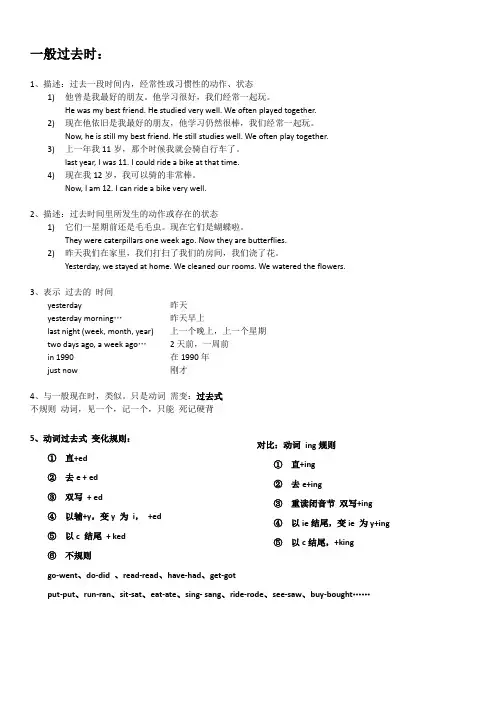
一般过去时:1、描述:过去一段时间内,经常性或习惯性的动作、状态1)他曾是我最好的朋友。
他学习很好,我们经常一起玩。
He was my best friend. He studied very well. We often played together.2)现在他依旧是我最好的朋友,他学习仍然很棒,我们经常一起玩。
Now, he is still my best friend. He still studies well. We often play together.3)上一年我11岁,那个时候我就会骑自行车了。
last year, I was 11. I could ride a bike at that time.4)现在我12岁,我可以骑的非常棒。
Now, I am 12. I can ride a bike very well.2、描述:过去时间里所发生的动作或存在的状态1)它们一星期前还是毛毛虫。
现在它们是蝴蝶啦。
They were caterpillars one week ago. Now they are butterflies.2)昨天我们在家里,我们打扫了我们的房间,我们浇了花。
Yesterday, we stayed at home. We cleaned our rooms. We watered the flowers.3、表示过去的时间yesterday昨天yesterday morning…昨天早上last night (week, month, year) 上一个晚上,上一个星期two days ago, a week ago…2天前,一周前in 1990 在1990年just now刚才4、与一般现在时,类似。
只是动词需变:过去式不规则动词,见一个,记一个,只能死记硬背5、动词过去式变化规则:①直+ed②去e + ed③双写+ ed④以辅+y,变y 为i,+ed⑤以c 结尾+ ked⑥不规则对比:动词ing规则①直+ing②去e+ing③重读闭音节双写+ing④以ie结尾,变ie 为y+ing⑤以c结尾,+kinggo-went、do-did 、read-read、have-had、get-gotput-put、run-ran、sit-sat、eat-ate、sing- sang、ride-rode、see-saw、buy-bought……一、写出下列动词的过去式:look dance live hopewatch stop plan walkwant study picnic carry二、用be 动词的正确形式填空1)I _______ at school just now.2)He ________ at the camp last week.3)We ________ students two years ago.4)They ________ on the farm a moment ago.5)Yang Ling ________ eleven years old last year.6)There ________ an apple on the plate yesterday.7)There ________ some milk in the fridge on Sunday.8)The mobile phone _______ on the sofa yesterday evening.三、用所给词的正确形式填空1)He _________ (live) in Wuxi two years ago.2)The cat ________ (eat) a bird last night.3)We _______ (have) a party last Halloween.4)Nancy ________ (pick) up oranges on the farm last week.5)I ________ (make) a model ship with Mike yesterday.6)They ________ (play) chess in the classroom last PE lesson.7)My mother ____________ (cook) a nice food last Spring Festival.8)The girls ________ (sing) and _________ (dance) at the party yesterday.。
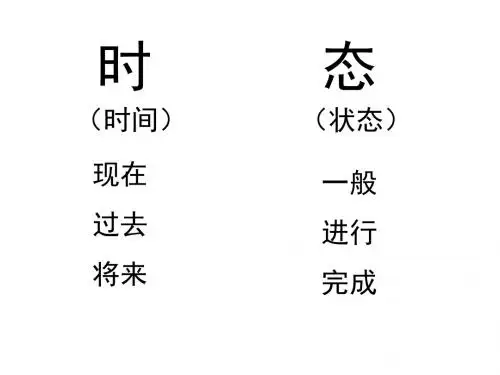
小升初英语动词时态动词时态是英语语法中的重要部分,正确运用各种时态可以使我们的表达更加准确和流利。
在小升初英语考试中,动词时态是一个重要的考点。
本文将介绍英语动词的主要时态及其用法,以帮助同学们更好地掌握动词时态知识。
一、一般现在时一般现在时表示经常发生的动作、客观事实或普遍真理等。
其构成为主语+动词原形,第三人称单数加-s。
例如:1. I eat breakfast every morning.2. He goes to school by bus.3. Water boils at 100 degrees Celsius.二、一般过去时一般过去时表示过去某个时间发生的动作或存在的状态。
其构成为主语+动词过去式。
例如:1. She watched a movie last night.2. They lived in London two years ago.3. We played soccer yesterday.三、一般将来时一般将来时表示将要发生的动作或存在的状态。
其构成为主语+will/shall+动词原形。
例如:1. I will finish my homework after school.2. They will visit their grandparents next week.3. He shall go to the party tomorrow.四、现在进行时现在进行时表示现在正在进行的动作。
其构成为主语+am/is/are+动词-ing。
例如:1. She is studying English now.2. They are playing basketball in the park.3. We are watching a movie at home.五、过去进行时过去进行时表示过去某个时间正在进行的动作。
其构成为主语+was/were+动词-ing。
例如:1. He was studying math at 8 o'clock last night.2. They were playing video games when I called them.3. We were watching TV when the phone rang.六、将来进行时将来进行时表示将来某个时间正在进行的动作。
小升初总复习精讲精练之动词(3)一般过去时【精讲】今天我们继续梳理小升初考试中另一个常考的时态考点:一般过去时。
一般过去时,顾名思义,就是描述已经发生的动作、事情或过去的某种状态。
同样,一般过去时也有它相关的一些关键词,如下:[关键词]1、与ago相关的时间短语, 如five minutes ago, Two days ago;2、与past相关的时间短语, 如in the past;3、与last相关的时间短语, 如last week, last month, last year;4、与yesterday 相关的时间短语, 如yesterday morning, yesterday evening。
[人称]在一般过去时中,无论出现什么人称,在动词形式上都没有区别,所有动词都用过去式。
[结构]主语+动词过去式+其他+表示过去的时间状语在这里我们主要说说动词过去式。
动词过去式的变法分为规则变化和不规则变化两种。
规则变化就是在动词词尾+ed,详见下表除了规则变化的动词过去式,还有一些不规则变化的动词过去式。
以下是我们总结出来常见的动词不规则过去式:那么一般过去时的三种句型又是怎样表达的呢?详见下表:(一)谓语是be动词时(二)谓语是实意动词时【精练】一、用括号内所给词的适当形式填空1、There ______ (be) a book on the desk five minutes ago.2、Look at this photo. We ______ (take) it five years ago. At that time, I ______ (be)only ten years old.3、My sister and I ______ (see) a movie yesterday.4、What ______ you ______ (do) last Sunday ?5、What ______ your mother ______ (do) yesterday morning ? She ______ (make)a big cake for me.二、根据括号内所给的时间提示改写句子1、There are some eggs in the fridge. (yesterday)2、How do you go to school every day? (last Monday)3、I often play games with my friends. (last weekend)4、I am free now. (the day before yesterday)5、My teacher is in her office now. (five minutes ago)【精练答案】一、1、was 2、took; was 3、saw 4、did; do 5、did; do; made二、1、There were some eggs in the fridge yesterday.2、How did you go to school last Monday ?3、I played games with my friends last Sunday.4、I was free the day before yesterday.5、My teacher was in her office five minutes ago.。
小升初英语单词过去时态的用法和构成标题:小升初英语单词:过去时态的用法和构成在英语学习中,过去时态是理解并掌握英语语法的重要组成部分。
过去时态主要由一般过去时、过去进行时和过去完成时三种形式组成,它们在表达过去发生的事情时,具有不同的特点和用法。
下面,我们将分别探讨过去时态的用法和构成。
1. 一般过去时一般过去时,也称为过去时,是英语中最基本的时态之一,表示过去发生的事情或状态。
其基本结构为:主语 + 过去时助动词 + 一般过去时的动词原形。
例如:- I (主语) studied English last year.- She (主语) finished her homework last night.- They (主语) played soccer last weekend.- She (主语) cooked dinner last night.- We (主语) went to the beach last summer.- She (主语) read a book last night.2. 过去进行时过去进行时,表示过去某一时间正在进行或发生的动作或状态。
其基本结构为:主语 + 过去进行时助动词 + 一般过去时的动词进行时形式。
例如:- I (主语) was studying English last year.- She (主语) was finishing her homework last night.- They (主语) were playing soccer last weekend.- She (主语) was cooking dinner last night.- We (主语) were going to the beach last summer.- She (主语) was reading a book last night.3. 过去完成时过去完成时,表示过去某一时间已经完成或实现的动作或状态。
小升初英语知识点时态总结一、简单现在时(Simple Present Tense)1. 概念:表示现在发生的动作、状况或习惯性的动作。
例句:I play basketball every weekend.(我每个周末打篮球。
)2. 构成:主语+动词原形(第三人称单数要加-s或-es)。
例句:She works in a hospital.(她在一家医院工作。
)二、一般过去时(Simple Past Tense)1. 概念:表示过去发生的动作或状态。
例句:Yesterday, I watched a movie.(昨天,我看了一部电影。
)2. 构成:主语+动词过去式。
例句:They visited the museum last week.(他们上周参观了博物馆。
)三、一般将来时(Simple Future Tense)1. 概念:表示将来发生的动作或状态。
例句:Tomorrow, I will go shopping.(明天,我会去购物。
)2. 构成:主语+will/shall+动词原形。
例句:She will study English in London next year.(她明年会在伦敦学习英语。
)四、现在进行时(Present Continuous Tense)1. 概念:表示现在进行的动作。
例句:He is reading a book now.(他正在看书。
)2. 构成:主语+am/is/are+动词-ing形式。
例句:They are playing football on the playground.(他们正在操场上踢足球。
)五、过去进行时(Past Continuous Tense)1. 概念:表示过去某一时刻或某一段时间正在进行的动作。
例句:At 8 o'clock yesterday evening, I was doing my homework.(昨天晚上8点钟,我正在做作业。
小升初常见时态用法归纳一、一般现在时态(Simple Present Tense)一般现在时态表示经常性、习惯性的动作或状态。
常与表示频率的副词连用,如often, always, usually等。
例句:1. He often goes to school by bus.2. She usually plays basketball on Saturdays.3. They always eat breakfast together.二、一般过去时态(Simple Past Tense)一般过去时态表示过去某个时间发生的动作或存在的状态。
常与表示过去时间的副词连用,如yesterday, last week等。
例句:1. He studied Chinese yesterday.2. She visited her grandparents last weekend.3. They played soccer in the park two days ago.三、一般将来时态(Simple Future Tense)一般将来时态表示将来会发生的动作或存在的状态。
常与表示将来的时间状语连用,如tomorrow, next week等。
例句:1. He will go to the movies tomorrow.2. She is going to visit her friend next week.3. They are playing soccer this weekend.四、现在进行时态(Present Continuous Tense)现在进行时态表示现在正在进行的动作,也可以表示计划好了即将发生的动作。
常与表示现在的时间副词连用,如now, at the moment等。
例句:1. He is studying English now.2. She is playing the piano at the moment.3. They are going to the party tonight.五、过去进行时态(Past Continuous Tense)过去进行时态表示在过去某个时间正在进行的动作。
小升初复习时态总结时态是英语语法中非常重要的部分,正确使用时态能够准确地表达时间和动作的关系。
在小升初的英语复习中,时态的掌握是一个重要的方面。
本文将为大家总结一下小升初英语复习时态的内容。
一、一般现在时一般现在时表示经常性的、习惯性的或一般性的动作或状态。
构成一般现在时的肯定句式为:主语 + 动词原形(-s / -es变化)。
例如:I eat an apple every day.(我每天吃一个苹果。
)二、一般过去时一般过去时表示发生在过去的动作或状态。
构成一般过去时的肯定句式为:主语 + 动词过去式。
例如:He played football yesterday.(他昨天踢足球。
)三、一般将来时一般将来时表示将来某个时间要发生的动作或状态。
构成一般将来时的肯定句式为:主语 + will + 动词原形。
例如:I will go to the park tomorrow.(我明天将去公园。
)四、现在进行时现在进行时表示现在正在进行或发生的动作。
构成现在进行时的肯定句式为:主语 + am / is / are + 动词-ing形式。
例如:She is reading a book now.(她正在看书。
)五、过去进行时过去进行时表示过去某个时间正在进行的动作。
构成过去进行时的肯定句式为:主语 + was / were + 动词-ing形式。
例如:They were playing basketball at that time.(他们那时正在打篮球。
)六、现在完成时现在完成时表示过去发生并且与现在有关的动作或状态。
构成现在完成时的肯定句式为:主语 + have / has + 动词过去分词。
例如:She has watched this movie three times.(她已经看过这部电影三次了。
)七、过去完成时过去完成时表示在过去某一时间或动作之前已经完成的动作。
构成过去完成时的肯定句式为:主语 + had + 动词过去分词。
小升初英语语法讲与练动词的时态(Ⅲ)一般过去时态1.一般过去时态的概念(1)表示过去某个时间发生的动作或存在的状态I went to the park yesterday.I failed my Chinese test.(2)表示过去经常或反复发生的动作I often went to school on foot.He worked hard last year.2.一般过去时的用法A、构成形式:主语+动词的过去式+其他。
注意:没有be动词的否定句和疑问句中,用didn’t否定和用did提问后,动词一定要用原形。
B、判断依据:(1)be动词是was、were;(2)动词加ed;(3)有表示过去的时间状语,现在学过的常用的表示过去的时间状语有:just now,a moment,yesterday,last week,last night,last weekend,last year,last month,three days ago,two weeks ago,five years ago…C、句型变换:3.动词过去式的变化规则动词过去式变化规则及其读音规则1、一般情况下,动词词尾加-ed ,如:work ---worked play---played wanted----wanted act----acted2、以不发音的-e 结尾动词,动词词尾加-d,如:live---lived move----moved taste---tasted hope---hoped3、以辅音字母+ y结尾的动词,把-y变为-i 再加-ed,如:study---studied copy---copied cry---cried carry---carried4、以一个辅音字母结尾的重读闭音节动词,双写词尾辅音字母,再加-ed,如:stop ---stopped5、不规则动词的过去式变化规律性不强,须多加记忆。
go – went make – made get – got buy – bought come – came fly-flew不规则动词的过去式的构成1.把动词原形中的i改为a,变成过去式。
如:begin—began,drink—drank,give—gave,ring—rang,sing—sang,sit—sat,swim—swam 2.把重读开音节中的i改为o,变成过去式。
如:drive—drove,ride—rode,write—wrote3.改动词原形中的aw /ow为ew,变成过去式。
如:draw—drew,grow—grew,know—knew,throw—threw(动词show除外,show—showed)4.动词原形中的e改为o,变成过去式。
如:get—got,forget—forgot5.动词原形中的ee改为e,变成过去式。
如:feed—fed,meet—met6.动词原形中的eep改为ept,变成过去式。
如:keep—kept,sleep—slept,sweep—swept7.动词原形中的eak改为oke,变成过去式。
如:break—broke,speak—spoke8.动词原形中的ell改为old,变成过去式。
如:sell—sold,tell—told9.动词原形中的an改为oo,变成过去式。
如:stand—stood,understand—understood10.以ought和aught结尾,且读音是〔:t〕的过去式。
如:bring—brought,buy— bought,think—thought,catch—caught,teach—taught11.以ould结尾且读音为〔ud〕的情态动词过去式。
如:can—could,shall—should,will—would12.把动词原形中的o改为a,变成过去式。
如:come—came,become—became13.在动词原形后加d或t变成过去式,并且发生音变。
如:hear〔hi 〕—heard〔h :d〕,say〔sei〕—said〔sed〕,mean〔mi:n〕—meant〔ment〕14.动词的过去式与动词原形一样。
如:let—let,must—must,put—put,read—read〔red〕15.不符合上述规律的动词过去式。
如:am,is—was,are—were,build—built,do—did,eat—ate,fall—fell,feel—felt,find—found,fly—flew,go—went,have /has— had,hold—held,leave—left,make—made,may—might,run—ran,see—saw,take—took过去式―-ed‖的发音规则(1)动词词尾为―t,d‖时,发/ id /音,want →wanted (要)need →needed (需要)(2)动词词尾为清辅音时,发/ t / 音。
help →helped (帮助)laugh →laughed (笑)look →looked (看)kiss →kissed (吻)w ash →washed (洗)watch →watched (注视)(3)动词词尾为t,d以外之浊辅音或元音时,发/ d /音。
call →called (叫)stay→stayed (停留)cry→cried (哭)小学常用不规则动词过去式原形过去式中文释义am was 是(表示存在、状态等)are were 是(表示存在、状态等)become became 成为;变成begin began 开始break broke 打破bring brought 拿来;取来;带来build built 构筑;建造;建筑buy bought 购买;买can could 可以;能;可能;会catch caught 赶上(车船等);捕获come came 来;来到cut cut 切;割;削;剪do/does did 做;干;行动draw drew 画drink drank 喝;饮drive drove 开车;驾驶eat ate 吃feel felt 感到;觉得find found 寻找;查找fly flew 飞行forget forgot 忘记;忘却get got 变得give gave 给;授予go went 去have/has had 得(病);患(病);有;吃;饮hear heard 听见;听说hide hid 隐藏is was 是(表示存在、状态等)keep kept 保持;使保持某种状态know knew 知道;了解leave left 离去;出发let let 允许;让lose lost 失去;丧失make made 使;促使;迫使;做;制作may might 可能;可以mean meant 表示……的意思;作……的解释meet met 遇见;相逢put put 放;摆;装read read /e/ 读;阅读ride rode 骑ring rang (铃)响rise rose 上升run ran 跑;奔跑say said 说;讲see saw 看见send sent 发送;寄;派;遣set set 放, 置show showed 出示;给……看shut shut 关上(门、盖、窗户等)sing sang 唱;唱歌sit sat 坐sleep slept 睡;睡觉speak spoke 说;说话swim swam 游泳take took 搭乘;花费(时间);拿走;带到teach taught 教;讲授tell told 告诉;讲述think thought 想;思考will would 将要win won 赢;获胜write wrote 书写练一练:A、用动词的适当形式填空。
1) It_____( be ) Ben’s birthday last Friday.2) We all_____ ( have ) a good time last night.3) He _____ ( jump ) high on last Sports Day.4) Helen _____ ( milk ) a cow on Friday.5) She likes_____newspapers, but she _____a book yesterday. ( read )6) He _____football now, but they _____basketball just now. ( play )7) Jim’s mother _____ ( plant ) trees just now.8) _____they _____ ( sweep ) the floor on Sunday? No, they_____.9) I _______ ( watch ) a cartoon on Monday.10) We_____ ( go ) to school on Sunday.B、按要求改写句子。
1) My father came to the shop just now.(改为否定句)My father_____ _____ to the shop just now.2) I watched TV last night.(改为一般疑问句,并作否定回答)---_____you _____ TV last _____? --- _____ , _____ _____.3) Their teacher told them a story yesterday.(对划线部分提问)_____ _____ their teacher_____them yesterday?4) They were on the farm last Saturday.(改为否定句)They _____ on the farm last Saturday.5) David and Liu Tao did their homework together a moment ago.(改为一般疑问句)_____ David and Liu Tao_____ _____ homework together _____ _____.C、选择填空。
( ) 1、My father __________football every week.A. playedB. playsC. playing( ) 2、I played basketball in the playground __________ weekend.A. lastB. nextC. this( ) 3、My grandparents __________ in the evenings.A. watchesB. watch TVC. watched TV( ) 4、Did Rose __________ last Sunday?A. went swimmingB. read a bookC. taking pictures( ) 5、Tom __________ very happy last night..A. looksB. isC. was( ) 6、He______TV at home last Sunday.A. watchesB.is watchingC. watched( ) 7、She_____to school at 6:40 every day, but yesterday she _____to school at 7:00.A. goes; goesB. goes; wentC. went; goes( ) 8. Tom ______very happy last night.A. looksB. isC. was( ) 9、Jim’s mother ______trees just now.A. plantedB. plantC. plants( ) 10、It was a long holiday. They_____ Shanghai on Mar. 2nd and _______ to Harbin on the 3rd.A. leave, gotB. left , getC. left, got( ) 11、She __________ homework last night.A. doesn’t , doB. don’t ,didC. didn’t ,do( ) 12、My sister ______at home yesterday evening.A. wasB. areC. were( ) 13. Did they _______the floor on Sunday?A. sweepB. sweepingC. sweeped( ) 14. He __________ in the river last week.A. swamB. swimsC. swum( ) 15. --Can you __________? -- Yes, I __________ last night.A. dance, dancedB. dances, danceC. danced ,danced( )16.----Can you ______?-----Yes, I _____ last night.A. dance; dancedB. dances; danceC. danced; danced( )17. I ______ ill yesterday.A. isB. wereC. was。